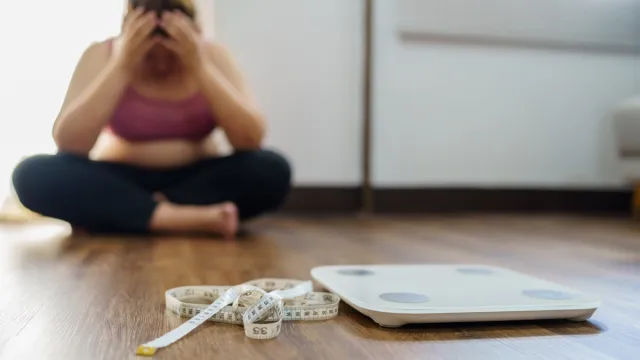When Your Weight Loss Will Plateau, Science Says—And How to Fight Back
You may stop dropping pounds eventually, no matter how you're trying to lose weight.

At the beginning of your weight-loss journey, you'll likely see the pounds fly off, but that pace doesn't last forever. Eventually, you'll find that your weight loss has slowed dramatically, until it finally seems to stop completely. This is inevitable regardless of how you're trying to shed pounds—whether through popular drugs like Ozempic, weight-loss surgery, or simply cutting calories and exercising—but the timing of your weight-loss plateau does have something to do with your methods. New research is now giving a clearer picture of a timeline, along with what you might need to do to push through it.
RELATED: Ozempic Patients Say It "Stops Working" for Weight Loss—How to Prevent That.
National Institutes of Health (NIH) researcher Kevin Hall, PhD, recently conducted a study to figure out when and why people stop losing weight. Published April 22 in the journal Obesity, Hall's study focused on determining when people reach a weight-loss plateau depending on how they're losing weight.
"Every obesity intervention eventually results in a body weight plateau, after which no further weight loss occurs," he stated in his research.
What Hall found was that the timing of that plateau changes depending on your intervention method. The researcher took data from different clinical trials to determine a mathematical model that predicts when people's weight-loss journeys can be expected to stall.
According to the study, those who were losing weight through calorie restriction alone reached a weight-loss plateau earlier than any other group: Based on his research, the study found that they typically stopped losing weight around the 12-month mark.
"As you lose weight, your metabolism declines, causing you to burn fewer calories than you did at your heavier weight," the experts at the Mayo Clinic explain. "To lose more weight, you need to either increase your physical activity or decrease the calories you eat. Using the same approach that worked at first may maintain your weight loss, but it won't lead to more weight loss."
Those taking the weight-loss drugs semaglutide (Wegovy and Ozempic) or tirzepatide (Zepbound and Mounjaro) were able to keep losing weight longer, according to Hall's study. Their plateau didn't hit until around the two-year mark.
Finally, those who underwent weight-loss surgery were able to keep losing weight for longer than any of the other groups. Hall's research indicated that they usually had around three years of weight loss before they reached their plateau.
RELATED: If You Want to Lose Weight, "Avoid These Foods Like the Plague," Fitness Expert Says.
For all groups, however, the end result was the same: They all still stopped losing weight at some point in their journey—even if various methods prolonged when that plateau would hit.
"What's happening is that they still experience an increase in appetite, the more weight that they lose," Hall told CNN. "If they had no appetite circuit, in other words, the drug just kind of kicked in and their intake stayed at this very low level. It would take many, many years for them to reach a plateau and they would lose, you know, an exorbitant amount of weight."
So, how can you fight back and continue working toward your weight-loss goals? If you want to keep shedding pounds after you hit your plateau, Hall said you may have to combine different methods.
"Another very common thing now is that people who didn't lose as much weight from bariatric surgery as they thought, will go on one of the GLP-1 receptor agonist so they're adding interventions on top of each other," he told CNN.
But at the end of the day, Hall said that maintaining healthy habits is the most important tool to continue your weight-loss journey no matter what methods you're using.
"A persistent effect is required to maintain the weight loss," he shared. "The whole point here is that whatever you do, you have to keep doing it. And so you've gotta be happy with that lifestyle intervention for the rest of your life. Otherwise, it's not going to have the added benefit."
Best Life offers the most up-to-date information from top experts, new research, and health agencies, but our content is not meant to be a substitute for professional guidance. When it comes to the medication you're taking or any other health questions you have, always consult your healthcare provider directly.





















